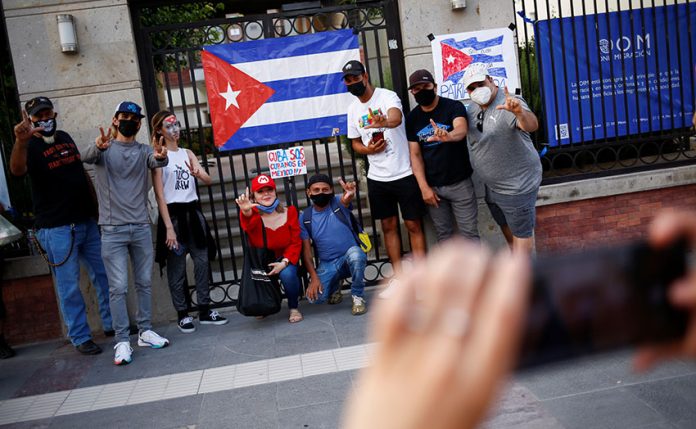President López Obrador offered his own remedy to Cuba’s largest protest in recent memory when he replied to a journalist at Monday morning’s news conference: end the U.S. trade embargo.
Hundreds of Cubans began protesting late last week against extended electricity blackouts and to demand Covid-19 vaccines. The gatherings spread throughout the country and escalated into demands for “freedom” and political change. Protesters shouted “Down with dictatorship” and “Homeland and life” – a play on the communist revolutionary slogan “Homeland or death,” posing a rare challenge to the regime of President Miguel Díaz-Canel, the successor of Fidel and Raúl Castro.
“The truth is that if [the international community] really wanted to help Cuba, the first thing to do is suspend the blockade … as the majority of the world’s countries are demanding … That would be a truly humanitarian gesture,” López Obrador said.
“No country in the world should be surrounded, blocked: that is absolutely contrary to human rights. You cannot create a fence and isolate an entire people for political reasons,” he added.
Mexico is prepared to provide the island’s population with medication, vaccines and food if requested, the president stated, before tasking Foreign Minister Marcelo Ebrard with establishing a link to provide aid.
AMLO, as the president is commonly known, said it was a matter for the people of Cuba to resolve, without addressing their lack of democratic recourse to help mediate the dispute. “The issue must not be politicized and humanitarian support must not be used as a banner to interfere in matters that only correspond to the Cubans to resolve … They must respect the self-determination of the Cuban people,” he said.
“I believe a resolution should be sought through dialogue, without the use of force, without confrontation, without violence.”
President Díaz-Canel repeated AMLO’s demand later on Monday, blaming the United States for the protests and promising to “confront and defeat” the trade embargo, which intensified during the presidency of Donald Trump.
However, he did not replicate his Mexican counterpart’s peaceful rhetoric: the protests were designed to “fracture the unity of the people,” he said, adding that the demonstrators “got what they deserved,” in allusion to police repression. Díaz-Canel had warned on Sunday that “provocations will not be allowed” and repeated Fidel Castro’s mantra: “The street belongs to the revolutionaries.”
Daniel, a Cuban studying in Mexico who declined to give his last name, said the blockade was too often a convenient excuse for the island’s leadership. “I don’t think in the short term raising the blockade is the solution to the protests in Cuba. The thousands of Cubans that are protesting in the street are there because of the poor administration which hasn’t been able to overcome economic inefficiency in the country for more than 60 years … The Cuban government is always blaming the blockade … they haven’t known how to develop the country from the inside. It’s an agricultural country that can produce from the Earth, which can produce food … but it’s easier to blame the blockade,” he said.
At the United Nations General Assembly on June 23, 184 countries voted in favor of a resolution to demand the end of the U.S. economic blockade for the 29th year in a row.
With reports from El País
